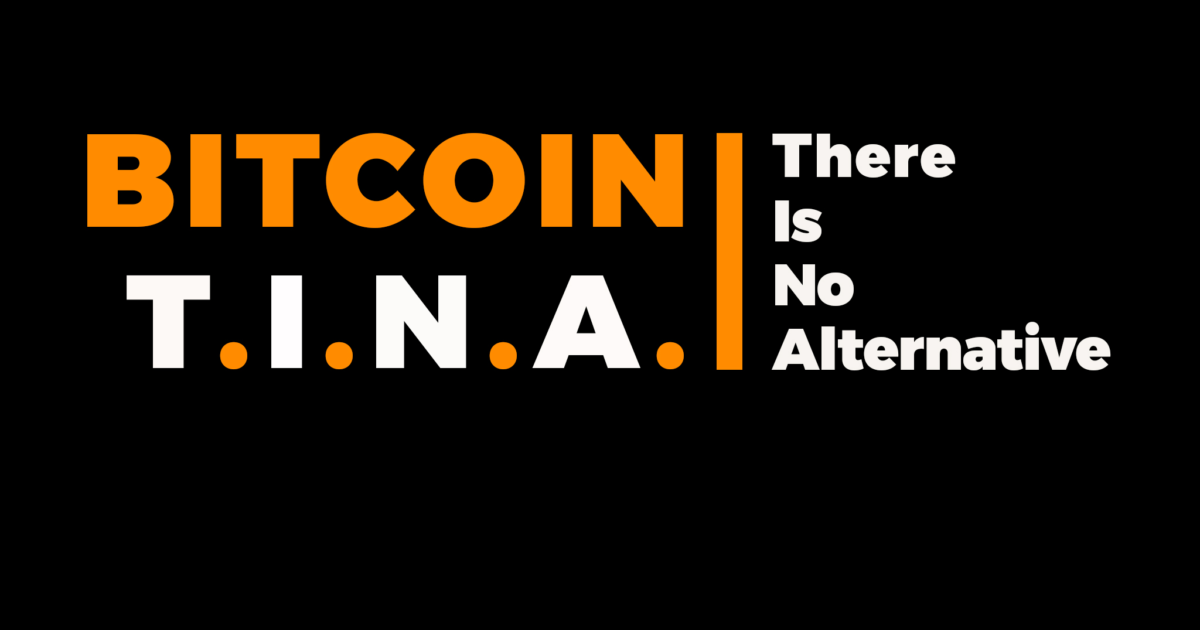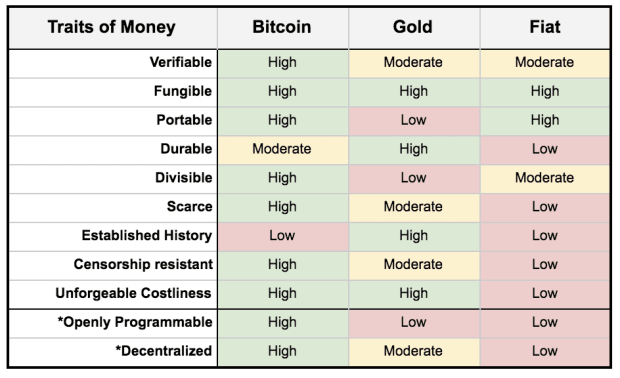Much Energy, Such Morals; Bitcoin Is Better
The energy debate is misleading, and characterizes energy usage as an objectively measurable undertaking (which is not true).
Bitcoin. Internal combustion engines. Netflix. Norton. Twitter. Facebook. Online banking. ATMs. Security cameras (and their systems). Printers. Lightbulbs. Christmas lights. Easy-Bake Ovens.Tinder.
They all require energy to produce, and all require energy to use. Pick any one from this list, (or anything else not on the list) and I could tell you why you don’t deserve to be able to use it because that energy could be “best used elsewhere.” You can police energy use with LITERALLY EVERYTHING.
We can take it down to the very calories you consume. Would you like to hear the reasons why you can’t eat? Unless you either produce the food yourself, or provide more than enough service to society, to the point where it can be justified that you deserve the food.
I didn’t think so. It’s a fool’s argument. But I’m not done here yet. We’re not done with fools. Let’s shift focus a bit.
Bitcoin is coming under fire — again — for radically uneducated claims that Bitcoin mining is negatively impactful to the environment. Okay, we’ll get to that. But, first… I would like to ask some questions about batteries.
Yes, Batteries
“Why batteries, Mike?” Let’s get into it.
Do you like having a smartphone? How about a laptop, or maybe a tablet? Yes? So you enjoy having battery technology, correct?
Green energy, (aka, renewable energy), has become the latest source of public angst and narrative-corralling. Whether it’s solar, wind or the latest and greatest electric vehicle (EV), they all have one thing in common; they need batteries. BIG batteries. And batteries are only able to function with a very special little mineral, called lithium.
Lithium is important because with it, we can manipulate the exchange of electrons between anode and cathode — allowing us to ultimately provide power to favorite devices, like our cell phones. This technology has allowed for some great advancements in quality of life for many populations the world over. But it’s not without cost.
Hold onto your butts, we’re headed to South America.
Bolivia, Chile, And Argentina — Welcome To The Lithium Triangle.
Where (according to research published by the Institute for Energy Research) 500,000 gallons of water gets used to produce one metric ton of lithium. This is done by pumping this water into the earth, where it picks up the minerals contained beneath the surface and results in a mixture called “brine.” This brine rises to the surface, where it is then left to sit while the water evaporates from the mixture, and the needed minerals are left behind. After a lengthy process of filtering the sediment by further evaporation techniques, over a year passes. According to the IER’s findings, mining operations such as these consumed 65% of the water in the Salar de Atacama region of Chile, an area that is now also struggling with provisioning water for farming and irrigation. These same operations also impacted the drinkable water supply in pretty alarming ways — part of the processing utilizes hydrochloric acid which, as in Tibet, leaks from the previously mentioned evaporation pools and into the local water supply.
“This isn’t a green solution — it’s not a green solution at all.” – Guillermo Gonzalez, 2009 interview regarding the negative impacts of lithium mining.
So, two questions….
How green are these green energy solutions? How do you feel about energy moralization, now?
We’re not done. Put your pants back on, because now we’re headed to Congo.
By Hand
“Why did we come to Africa, Mike? We just flew to South America, we’ve easily traveled 8,000-plus miles. And I wanna relax and take my pants back off.” Hold your horses, I’m all for depantsing, but this is pretty important to our conversation.
Congo has a very interesting mining industry. I say interesting but what I really mean is archaic, dangerous, inhumane, destructive, and frankly, disappointing. Here, communities mine for cobalt. This is done by hand. BY HAND. With a hand and shovel. Not even with hardhats or basic personal protective equipment. These hard-working, proud, strong human beings even take naps deep within the mines while they’re working.
This process supplies 60% of the world’s cobalt demand. SIXTY PERCENT. The majority of the world’s cobalt, which powers the batteries for our high-tech gadgets is provided by local citizens forced to work in conditions which also poison their communities in the process. This creates a negative feedback loop of misery and dysfunction in their lives.*
The reason that the world demands cobalt so vigorously is that it provides structural support during the electron exchange process which occurs within a lithium ion battery. This basically allows for a battery to contain a greater density of power. The more power density within the battery, the more power it can hold, and for longer.
How good for the environment are lithium-ion batteries?
For example, a Tesla Model S requires 12 kilograms (kg) of lithium, per battery. At this rate if we use the numbers from earlier, that means that for every 500,000 gallons of water used (in Chile) per metric ton (or 1,000 kg) of lithium produced we get… 83 Tesla Model Ss.
Tesla produced 54,805 Model Ss in 2020. That means that that 500,000 gallon process was repeated 657.9 times. That’s 328,950,000 gallons of water spent to yield about 660,000 kg of lithium.
(54,805 / 83 = 657.9) | (657.9 x 500,000 = 328.95 million) | (657.9 x 1,000 = 657,900) — by all means, check my math. But I’m pretty sure I’m on track.
This is just for one model of Tesla’s EVs. Now multiply this process out for all of the other EVs coming to market in response to Tesla’s popularity: Cadillac, Ford, GM, Mercedez, and so on. Then multiply it for all of the batteries needed for solar arrays, wind turbines, iPhone 12 Pros, and your Windows Surface.
Are we done with the virtue signaling? Not only are these some grave environmental impacts, but one could also make the claim that a lot of that energy use could be better spent (instead of being used to help build electronics to be purchased by consumers who, more than likely, do not need them).
“But, Mike, Bitcoin mining wastes so much energy. I hardly think this industry is nearly as impactful as those evil Bitcoin miners, that are wasting energy to support a network for magic internet money.”
UGGGGGGGGGGGGGGGHHHHHHHHHHHHHHHHHHHHHHH… okay.
Firstly, the energy that gets utilized by the Bitcoin network is performing many functions -all simultaneously. Let’s list a few:
-Network security (distributed ledger technology)
-Accounting (network confirmations)
-Transaction processing (mining)
-Monetary policy (mining yield)
*While all of this is being done, the network security (because of the distributed ledger technology) also allows for a level of trust that is not quantifiable. Individuals that measure their worth in bitcoin rest easy knowing that their wealth is as equally secured as the billionaires’. Good luck measuring that, or providing the same level of security across all socio-economic status’ without a tiered pricing system. Such would result in the richest gaining the best security, while the poorer receive the lesser quality security.
Luckily for me, ARK Invest has actually produced a beautiful infographic to show just how efficient Bitcoin is versus the legacy banking system.
You’re right, you make a good point. Bitcoin does still use renewable energies, which aren’t great for the environment, as we have established. My point is that Bitcoin doubles-down on the efficiency argument. First, with the efficiencies as stated above, secondly with Nic Carter, who points out in his article, “What Bloomberg Gets Wrong About Bitcoin’s Climate Footprint,” that
“…39% of Bitcoin’s energy outlay derives from renewables, with 76% of miners using renewables in some capacity.”
Bitcoin is wildly more efficient than the current system is, even if we just focus upon the energy expenditure angle. On top of that, the majority of the miners (which have been the target of this latest narrative offensive), are largely powered by the cleaner energy sector. AND, going even deeper, Bitcoin miners are reducing the carbon footprint of current fossil fuels systems at the same time through the capture of fare gas (which is normally just burnt off at zero-profit, because the cost to store and ship the gas costs more than to simply burn it). The fact that all of those processes are occurring simultaneously is a factor of time expenditure that it (Bitcoin) is also streamlining.
I, like the rest of the Bitcoin community, am so exhausted from arguing how beneficial Bitcoin’s monetization of the energy sector is that I would much rather not waste my time. Instead, I would much rather direct you to a few very high quality readings by some much higher quality thinkers than myself.
Follow the list below:
“Uncovering The Hidden Costs of the Petrodollar” by Alex Gladstein
“The Frustrating, Maddening, All-Consuming Bitcoin Energy Debate” by Nic Carter
“PoW Is Efficient” by Dan Held
Bitcoin is bigger, and more important than the mewlings of a billionaire over mechanisms that he clearly hasn’t done his diligence in understanding. Even if he is wildly intelligent, it is implausible for anyone to know absolutely everything. And no, just because he was part of PayPal’s success does not automagically equate to him getting a free pass to claim to understand “money” without getting pushback.
The majority of the population understands that an iPhone works, very few understand “how,” or “why.”
Can We Be Done, Now?
Are we done virtue signaling over energy use? Can we be?
This writing isn’t an attempt to necessarily cast shade on Tesla in particular, it’s to cast shade on the disingenuous energy debate in general. Civilizations develop and ascend as more energy becomes capturable, storable and usable.
Bitcoin is wildly more efficient than the current system. Don’t try to moralize the energy use, you’ll just be made a fool. And a fool on a very, very public stage.
Oh and by the way, we haven’t even gotten into discussing the “carbon credits” market (or “scheme” as I prefer to label it). Renewable Energy Certificates (RECs) are rumored to be a major motivator in Elon Musk’s tweet barrage leading into the weekend of May 16. I invite all of you to look into this aspect of the energy debate, and Alex Gladstein’s writing on the petrodollar is an absolute MUST read.
Bitcoin doesn’t hold grudges. It will be here to protect your purchasing power. It is up to the community to defend the integrity of the system. We check the people/groups that claim to believe they know better.
None of our systems are perfect, yet. Just because they aren’t perfect doesn’t mean we shouldn’t use them at all. What it does mean is that we still have plenty of work to do, and that there’s always room for improvement.
References:
Institute For Energy Research
How Lithium Ion Batteries Work
Tesla Model S Production
Guillermo Gonzalez
ARK Invest:
Dan Held:
Nic Carter
RECS
“The Environmental Impact of Lithium Batteries.” IER, 12 Nov. 2020, www.instituteforenergyresearch.org/renewable/the-environmental-impact-of-lithium-batteries/.
“How Does a Lithium-Ion Battery Work?” Energy.gov, 14 Sept. 2017, www.energy.gov/eere/articles/how-does-lithium-ion-battery-work#:~:text=The%20Basics,vice%20versa%20through%20the%20separator.
“Tesla Q4 2020 Vehicle Production & Deliveries: Tesla Investor Relations.” Tesla, Globe Newswire, 2 Jan. 2021, ir.tesla.com/press-release/tesla-q4-2020-vehicle-production-deliveries.
“This Is Where Your Smartphone Battery Begins.” The Washington Post, WP Company, 30 Sept. 2016, www.washingtonpost.com/graphics/business/batteries/congo-cobalt-mining-for-lithium-ion-battery/.
This is a guest post by Mike Hobart . Opinions expressed are entirely their own and do not necessarily reflect those of BTC, Inc. or Bitcoin Magazine.









